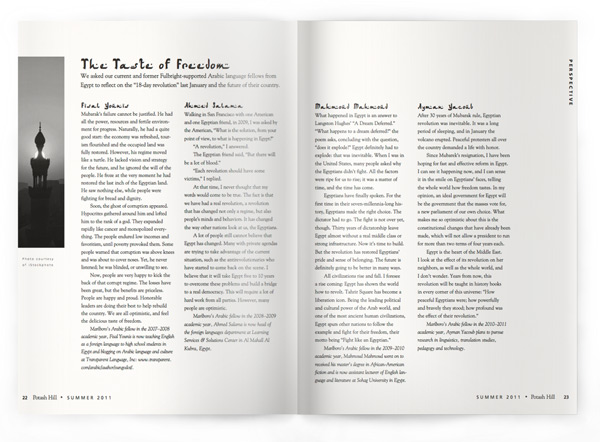The Taste of Freedom

We asked our current and former Fulbright-supported Arabic language fellows from Egypt to reflect on the “18-day revolution” last January and the future of their country.
Fisal Younis Mubarak’s failure cannot be justified. He had all the power, resources and fertile environment for progress. Naturally, he had a quite good start: the economy was refreshed, tourism flourished and the occupied land was fully restored. However, his regime moved like a turtle. He lacked vision and strategy for the future, and he ignored the will of the people. He froze at the very moment he had restored the last inch of the Egyptian land. He saw nothing else, while people were fighting for bread and dignity.
Mubarak’s failure cannot be justified. He had all the power, resources and fertile environment for progress. Naturally, he had a quite good start: the economy was refreshed, tourism flourished and the occupied land was fully restored. However, his regime moved like a turtle. He lacked vision and strategy for the future, and he ignored the will of the people. He froze at the very moment he had restored the last inch of the Egyptian land. He saw nothing else, while people were fighting for bread and dignity.
Soon, the ghost of corruption appeared. Hypocrites gathered around him and lofted him to the rank of a god. They expanded rapidly like cancer and monopolized everything. The people endured low incomes and favoritism, until poverty provoked them. Some people warned that corruption was above knees and was about to cover noses. Yet, he never listened; he was blinded, or unwilling to see.
Now, people are very happy to kick the back of that corrupt regime. The losses have been great, but the benefits are priceless. People are happy and proud. Honorable
leaders are doing their best to help rebuild the country. We are all optimistic, and feel the delicious taste of freedom.
Marlboro’s Arabic fellow in the 2007–2008 academic year, Fisal Younis is now teaching English as a foreign language to high school students in Egypt and blogging on Arabic language and culture at Transparent Language, Inc.
Ahmed Salama Walking in San Francisco with one American and one Egyptian friend, in 2009, I was asked by the American, “What is the solution, from your point of view, to what is happening in Egypt?”
Walking in San Francisco with one American and one Egyptian friend, in 2009, I was asked by the American, “What is the solution, from your point of view, to what is happening in Egypt?”
“A revolution,” I answered.
The Egyptian friend said, “But there will be a lot of blood.”
“Each revolution should have some victims,” I replied.
At that time, I never thought that my words would come to be true. The fact is that we have had a real revolution, a revolution that has changed not only a regime, but also people’s minds and behaviors. It has changed the way other nations look at us, the Egyptians.
A lot of people still cannot believe that Egypt has changed. Many with private agendas are trying to take advantage of the current situation, such as the antirevolutionaries who have started to come back on the scene. I believe that it will take Egypt five to 10 years to overcome these problems and build a bridge to a real democracy. This will require a lot of hard work from all parties. However, many people are optimistic.
Marlboro’s Arabic fellow in the 2008–2009 academic year, Ahmed Salama is now head of the foreign languages department at Learning Services & Solutions Center in Al Mahall Al Kubra, Egypt.
Mahmoud Mahmoud What happened in Egypt is an answer to Langston Hughes’ “A Dream Deferred.” “What happens to a dream deferred?” the poem asks, concluding with the question, “does it explode?” Egypt definitely had to explode: that was inevitable. When I was in the United States, many people asked why the Egyptians didn’t fight. All the factors were ripe for us to rise; it was a matter of time, and the time has come.
What happened in Egypt is an answer to Langston Hughes’ “A Dream Deferred.” “What happens to a dream deferred?” the poem asks, concluding with the question, “does it explode?” Egypt definitely had to explode: that was inevitable. When I was in the United States, many people asked why the Egyptians didn’t fight. All the factors were ripe for us to rise; it was a matter of time, and the time has come.
Egyptians have finally spoken. For the first time in their seven-millennia-long history, Egyptians made the right choice. The dictator had to go. The fight is not over yet, though. Thirty years of dictatorship leave Egypt almost without a real middle class or strong infrastructure. Now it’s time to build. But the revolution has restored Egyptians’ pride and sense of belonging. The future is definitely going to be better in many ways.
All civilizations rise and fall. I foresee a rise coming: Egypt has shown the world how to revolt. Tahrir Square has become a liberation icon. Being the leading political and cultural power of the Arab world, and one of the most ancient human civilizations, Egypt spurs other nations to follow the example and fight for their freedom, their motto being “Fight like an Egyptian.”
Marlboro’s Arabic fellow in the 2009–2010 academic year, Mahmoud Mahmoud went on to received his master’s degree in African-American fiction and is now assistant lecturer of English language and literature at Sohag University in Egypt.
Ayman Yacoub After 30 years of Mubarak rule, Egyptian revolution was inevitable. It was a long period of sleeping, and in January the volcano erupted. Peaceful protesters all over the country demanded a life with honor.
After 30 years of Mubarak rule, Egyptian revolution was inevitable. It was a long period of sleeping, and in January the volcano erupted. Peaceful protesters all over the country demanded a life with honor.
Since Mubarek’s resignation, I have been hoping for fast and effective reform in Egypt. I can see it happening now, and I can sense it in the smile on Egyptians’ faces, telling the whole world how freedom tastes. In my opinion, an ideal government for Egypt will be the government that the masses vote for, a new parliament of our own choice. What makes me so optimistic about this is the constitutional changes that have already been made, which will not allow a president to run for more than two terms of four years each.
Egypt is the heart of the Middle East. I look at the effect of its revolution on her neighbors, as well as the whole world, and I don’t wonder. Years from now, this
revolution will be taught in history books in every corner of this universe: “How
peaceful Egyptians were; how powerfully and bravely they stood; how profound was the effect of their revolution.”
Marlboro’s Arabic fellow in the 2010–2011 academic year, Ayman Yacoub plans to pursue research in linguistics, translation studies, pedagogy and technology.